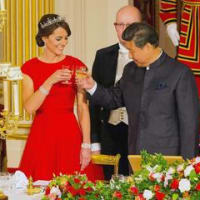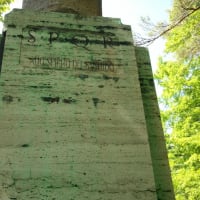
Japan Voters Choose Opponent of New U.S. Base as Okinawa Governor
Victory a Blow to Japan Prime Minister Shinzo Abe, Whose Party Backed the Incumbent
http://online.wsj.com/articles/japan-voters-choose-opponent-of-new-u-s-base-as-okinawa-governor-1416137296
By ALEXANDER MARTIN
Updated Nov. 16, 2014 7:14 a.m. ET
5 COMMENTS
TOKYO—A staunch opponent of a U.S.-Japan plan to build a new American military base on Japan’s southern island of Okinawa was elected governor of the prefecture Sunday, according to multiple Japanese media organizations, complicating the allies’ regional-security strategy to counter a rising China.
Former Naha Mayor Takeshi Onaga ousted the government-backed incumbent after campaigning against the planned relocation of a U.S. Marine Corps air station from an urban center to the prefecture’s less-populated northeastern coast. It comes as the island, long dependent on the U.S. military to prop up its economy, has developed a booming tourist industry, giving residents greater confidence to challenge the American presence.
Mr. Onaga’s victory could set back Japan’s efforts to bolster defense ties with the U.S. amid a territorial dispute with China. It also creates a new political headache for Prime Minister Shinzo Abe, whose ruling party backed the incumbent, Hirokazu Nakaima.
It is the second big loss in a regional gubernatorial election for Mr. Abe in recent months. A poll released Nov. 10 by public broadcaster NHK showed national support for Mr. Abe’s cabinet down 8% from the previous month, and now at 44%, dragged down by scandals in his administration and voter anxiety over economic weakness after a spring tax increase.
Mr. Abe, who has been in office for two years, is expected to decide this week to call a snap election for mid-December, seeking a fresh mandate from the voters.
Mr. Onaga’s victory also calls into question whether the government can proceed with the long-stalled plan to move the Futenma Marine base from the densely populated city of Ginowan to the rural Henoko district in the city of Nago.
“I will do everything possible to prevent the construction of a new base in Henoko. Futenma needs to be moved out of the nation and out of the prefecture,” Mr. Onaga said after his victory became likely.
Futenma has long been a sore point between Tokyo and Washington. Local residents complain of noise pollution and occasional air accidents related to the base and have demanded the facility shut down or be moved outside Okinawa. The U.S., which returned Okinawa to Japan in 1972 after a long postwar occupation, agreed in 1996 to relocate Futenma after three American servicemen raped a 12-year-old Okinawan girl in 1995, triggering widespread anti-base protests.
The U.S. and Japanese governments created the relocation plan in the hope that moving the base to a more isolated region would diminish local opposition to hosting Marines on the island. But the plan has been bogged down for nearly two decades over local opposition in the community designated to host the new base. Mr. Abe had pledged to break that long logjam when he took office in 2012, and had appeared to be making progress—until Sunday’s vote.
Mr. Onaga wants to halt the Futenma base without any replacement, and demands the marines there move off Okinawa Island. “Out of Okinawa, out of Japan,” was his campaign slogan.
Mr. Onaga’s predecessor, Mr. Nakaima, approved a crucial landfill project off Henoko’s coast in December. He did so, despite initially telling voters he was against the plan.
Washington praised the decision at the time. Defense Secretary Chuck Hagel issued a statement saying Mr. Nakaima’s move would aid the Pentagon’s “ability to maintain a geographically distributed, operationally resilient, and politically sustainable force posture in the region.”
A former trade-ministry bureaucrat, Mr. Nakaima, 75, served two terms as Okinawa governor. However, his approval of the landfill drew strong protests from those blaming him of bowing to Tokyo, fueling the successful campaign of Mr. Onaga, who is 64 years old, over Mr. Nakaima and two other candidates.
“We cannot postpone the Futenma issue any longer,” Mr. Nakaima said during a campaign rally Saturday night, as he defended his stance on the issue, saying the relocation to Henoko was the only realistic option in removing potential dangers from the air base.
Okinawa has been key to the U.S. defense strategy in the Asia-Pacific since Japan’s defeat in World War II and has been host to three-quarters of American bases in the nation. But Okinawans have resented the disproportionate concentration of bases on their island and have been asking for a reduced U.S. military footprint.
During a recent interview with The Wall Street Journal, Mr. Onaga said he would review paperwork related to the landfill project once he was elected, and would seek nullification of the earlier approval should there be any legal problems. But he hasn’t promised concretely to revoke the permits, which has drawn some criticism from hard-core base opponents, and given some hope to base supporters.
Mr. Onaga, said a new base in Henoko could be devastating to the area’s potential as a future tourist destination at a time when increasing numbers of visitors are coming to Okinawa.
Revenue related to hosting U.S. bases, which accounted for 15.5% of Okinawa’s economy in 1972, now accounts for about 5%, according to the prefecture.
“Okinawa has the human resources and capital, what we don’t have is enough land,” Mr. Onaga said. “Bases occupy 18.4% of Okinawa’s main island—there won’t be economic development unless this land is returned.”
Write to Alexander Martin at alexander.martin@wsj.com
---------------------------------------------------------
[jamawns' comment]
---------------------------------------------------------
Floating vote had made results. All the mass media in Okinawa biased against the U.S. strongly influenced on the floating people.
Building environment for logical and ethical thinking is required in Okinawa, by showing CCP'S purge, corruption and betray social system.
People in other prefecture need to stay with Okinawa to pursue Okinawa's happiness and Japan's future, because the road to profit center in ASIA for Okinawa may be exist.
https://pbs.twimg.com/media/B2j5VIFCMAAH9zq.jpg
Away from biased Okinawa media, people must know that crime ratio of population of U.S. Military in Okinawa is much lower than that of citizens in Okinawa.
http://goo.gl/eJwJ8X
When it comes to Okinawa governor election, the number of ILLEGAL posters, flags, banners, campaign cars and stickers on poles consisted of 70% from ONAGA group, 20% from SHIMOJI group, and 10% from NAKAIMA group. We can easily guess that Mr. ONAGA will deeply make numerous political corruptions as CCP had done.
http://goo.gl/a7llA4
Victory a Blow to Japan Prime Minister Shinzo Abe, Whose Party Backed the Incumbent
http://online.wsj.com/articles/japan-voters-choose-opponent-of-new-u-s-base-as-okinawa-governor-1416137296
By ALEXANDER MARTIN
Updated Nov. 16, 2014 7:14 a.m. ET
5 COMMENTS
TOKYO—A staunch opponent of a U.S.-Japan plan to build a new American military base on Japan’s southern island of Okinawa was elected governor of the prefecture Sunday, according to multiple Japanese media organizations, complicating the allies’ regional-security strategy to counter a rising China.
Former Naha Mayor Takeshi Onaga ousted the government-backed incumbent after campaigning against the planned relocation of a U.S. Marine Corps air station from an urban center to the prefecture’s less-populated northeastern coast. It comes as the island, long dependent on the U.S. military to prop up its economy, has developed a booming tourist industry, giving residents greater confidence to challenge the American presence.
Mr. Onaga’s victory could set back Japan’s efforts to bolster defense ties with the U.S. amid a territorial dispute with China. It also creates a new political headache for Prime Minister Shinzo Abe, whose ruling party backed the incumbent, Hirokazu Nakaima.
It is the second big loss in a regional gubernatorial election for Mr. Abe in recent months. A poll released Nov. 10 by public broadcaster NHK showed national support for Mr. Abe’s cabinet down 8% from the previous month, and now at 44%, dragged down by scandals in his administration and voter anxiety over economic weakness after a spring tax increase.
Mr. Abe, who has been in office for two years, is expected to decide this week to call a snap election for mid-December, seeking a fresh mandate from the voters.
Mr. Onaga’s victory also calls into question whether the government can proceed with the long-stalled plan to move the Futenma Marine base from the densely populated city of Ginowan to the rural Henoko district in the city of Nago.
“I will do everything possible to prevent the construction of a new base in Henoko. Futenma needs to be moved out of the nation and out of the prefecture,” Mr. Onaga said after his victory became likely.
Futenma has long been a sore point between Tokyo and Washington. Local residents complain of noise pollution and occasional air accidents related to the base and have demanded the facility shut down or be moved outside Okinawa. The U.S., which returned Okinawa to Japan in 1972 after a long postwar occupation, agreed in 1996 to relocate Futenma after three American servicemen raped a 12-year-old Okinawan girl in 1995, triggering widespread anti-base protests.
The U.S. and Japanese governments created the relocation plan in the hope that moving the base to a more isolated region would diminish local opposition to hosting Marines on the island. But the plan has been bogged down for nearly two decades over local opposition in the community designated to host the new base. Mr. Abe had pledged to break that long logjam when he took office in 2012, and had appeared to be making progress—until Sunday’s vote.
Mr. Onaga wants to halt the Futenma base without any replacement, and demands the marines there move off Okinawa Island. “Out of Okinawa, out of Japan,” was his campaign slogan.
Mr. Onaga’s predecessor, Mr. Nakaima, approved a crucial landfill project off Henoko’s coast in December. He did so, despite initially telling voters he was against the plan.
Washington praised the decision at the time. Defense Secretary Chuck Hagel issued a statement saying Mr. Nakaima’s move would aid the Pentagon’s “ability to maintain a geographically distributed, operationally resilient, and politically sustainable force posture in the region.”
A former trade-ministry bureaucrat, Mr. Nakaima, 75, served two terms as Okinawa governor. However, his approval of the landfill drew strong protests from those blaming him of bowing to Tokyo, fueling the successful campaign of Mr. Onaga, who is 64 years old, over Mr. Nakaima and two other candidates.
“We cannot postpone the Futenma issue any longer,” Mr. Nakaima said during a campaign rally Saturday night, as he defended his stance on the issue, saying the relocation to Henoko was the only realistic option in removing potential dangers from the air base.
Okinawa has been key to the U.S. defense strategy in the Asia-Pacific since Japan’s defeat in World War II and has been host to three-quarters of American bases in the nation. But Okinawans have resented the disproportionate concentration of bases on their island and have been asking for a reduced U.S. military footprint.
During a recent interview with The Wall Street Journal, Mr. Onaga said he would review paperwork related to the landfill project once he was elected, and would seek nullification of the earlier approval should there be any legal problems. But he hasn’t promised concretely to revoke the permits, which has drawn some criticism from hard-core base opponents, and given some hope to base supporters.
Mr. Onaga, said a new base in Henoko could be devastating to the area’s potential as a future tourist destination at a time when increasing numbers of visitors are coming to Okinawa.
Revenue related to hosting U.S. bases, which accounted for 15.5% of Okinawa’s economy in 1972, now accounts for about 5%, according to the prefecture.
“Okinawa has the human resources and capital, what we don’t have is enough land,” Mr. Onaga said. “Bases occupy 18.4% of Okinawa’s main island—there won’t be economic development unless this land is returned.”
Write to Alexander Martin at alexander.martin@wsj.com
---------------------------------------------------------
[jamawns' comment]
---------------------------------------------------------
Floating vote had made results. All the mass media in Okinawa biased against the U.S. strongly influenced on the floating people.
Building environment for logical and ethical thinking is required in Okinawa, by showing CCP'S purge, corruption and betray social system.
People in other prefecture need to stay with Okinawa to pursue Okinawa's happiness and Japan's future, because the road to profit center in ASIA for Okinawa may be exist.
https://pbs.twimg.com/media/B2j5VIFCMAAH9zq.jpg
Away from biased Okinawa media, people must know that crime ratio of population of U.S. Military in Okinawa is much lower than that of citizens in Okinawa.
http://goo.gl/eJwJ8X
When it comes to Okinawa governor election, the number of ILLEGAL posters, flags, banners, campaign cars and stickers on poles consisted of 70% from ONAGA group, 20% from SHIMOJI group, and 10% from NAKAIMA group. We can easily guess that Mr. ONAGA will deeply make numerous political corruptions as CCP had done.
http://goo.gl/a7llA4










![[Sputonic] What's Behind Japan 'Wavering' Between Two Opposing Policies Towards Russia](https://blogimg.goo.ne.jp/image/upload/f_auto,q_auto,t_image_square_m/v1/user_image/7c/d8/c11144c8fd1ce7dd82fbe843c0d343a5.jpg)
![[Sputonic] Russia regrets Japan distorting WWII facts](https://blogimg.goo.ne.jp/image/upload/f_auto,q_auto,t_image_square_m/v1/user_image/57/06/793fc0e53452ae59778dc2d8ecbaa8ba.jpg)
![[WSJ] Taiwan’s Historic Election Set to Test China Ties](https://blogimg.goo.ne.jp/image/upload/f_auto,q_auto,t_image_square_m/v1/user_image/25/98/95904d9d578fce5f80ca404cf96bdcab.jpg)


![[WSJ] World War II Anniversary Opens Old Wounds in Japan Over How Much to Apologize (3/3)](https://blogimg.goo.ne.jp/image/upload/f_auto,q_auto,t_image_square_m/v1/user_image/19/28/6cbc12baf2a79a285750c1f78f53d33f.jpg)



※コメント投稿者のブログIDはブログ作成者のみに通知されます